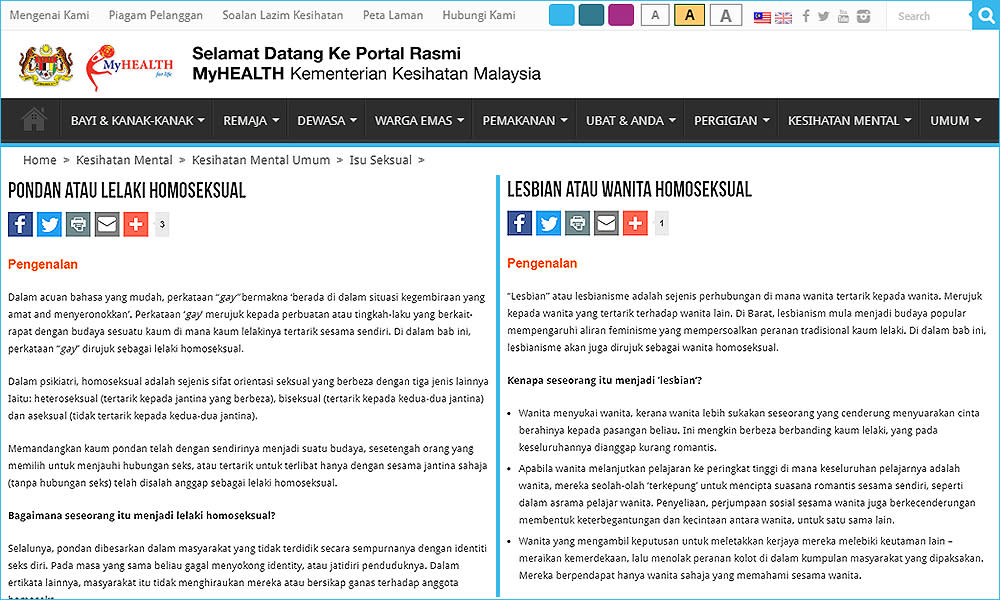'Lesbian, pondan' - Netizens find more questionable articles on MOH education portal

After coming under fire for a victim-blaming article on sexual harassment, members of the public have highlighted more questionable write-ups - this time concerning homosexuality - on the Health Ministry’s public health portal.
One article from 2013 claims that women tend to become lesbian if they “prioritise their career”.
It also claims women who “further their studies” in a female-centric environment could turn into lesbians.
“When a woman pursues higher education where all the students are women, it is as if they are ‘surrounded’ (and thus) create a romantic atmosphere with each other, like in a female dormitory.
“Supervision and social encounters with women could also make women form a dependence and love for each other.
“Women who choose to put their careers above other priorities, celebrate their own independence and reject archaic roles that society forces upon them believe only women understand women,” said the article to the question “why does one become lesbian”.
Another article also from eight years ago states that men become “pondan” (homosexual) because they are raised in a society that “does not educate them about their sexual identity”.
Both were authored by an academic who is also a registered psychiatrist.
They were published in MyHealth - a website that serves as the ministry’s platform to educate the public on a wide variety of health conditions and issues.
Homosexuals ‘choose to be less accepted’
Also found on the website is a 2012 article on sexual orientation which discourages the use of words like “pondan”.
It said homosexuals should not be discriminated against, and should be given equal treatment.
It also said that homosexuality was not a mental health disease.
However, the write-up said that those attracted to the same gender will end up “suffering in silence” from conforming to societal standards, and have a higher risk of developing drug abuse, mental health issues, sexually transmitted diseases and “behavioural” problems.
It then encourages homosexuals to seek help from groups like Befrienders - an NGO most known for offering help to those who have suicidal thoughts or struggle with mental health issues.
“If you choose to be heterosexual, you will belong in the majority.
“If you choose homosexuality or bisexuality, you should be aware that you are choosing to be less accepted by society,” the article read.
This piece was authored by two paediatricians.
Other than the victim-blaming sexual harassment article, @KKMPutrajaya has more rubbish on its website than you think. pic.twitter.com/oT712fXGCB
These articles were unearthed by Twitter users after uproar over a now-deleted article on the portal which erroneously claimed sexual harassment happened when victims have a “sexy and attractive body shape”, “charming personality”, “unsuitable clothing style” and “unrestricted social interactions”.
It further “advised” women against working alone past the usual working hours to prevent being sexually harassed.
Health director-general Dr Noor Hisham Abdullah later said the article - which was written by a registered counsellor - was the author’s “personal opinion”.
This was despite it being on the ministry’s website since 2016.


